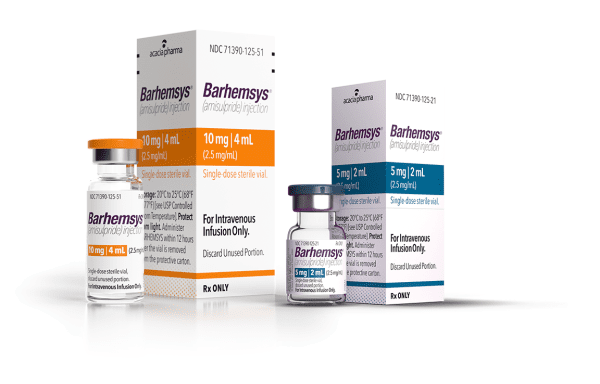Amisulpride
Generic name: amisulpride [ A-mi-SUL-pride ]
Brand name: Barhemsys
Dosage form: intravenous solution (5 mg/2 mL)
Drug classes: Atypical antipsychotics, Miscellaneous antiemetics
What is amisulpride?
Amisulpride is used alone or with other medications to prevent nausea and vomiting after a surgery.
Amisulpride may also be used for purposes not listed in this medication guide.
Amisulpride side effects
Get emergency medical help if you have signs of an allergic reaction: hives; difficult breathing; swelling of your face, lips, tongue, or throat.
Amisulpride may cause serious side effects. Call your doctor at once if you have:
-
sudden dizziness (like you might pass out);
-
fast or pounding heartbeats, fluttering in your chest;
-
low potassium level--leg cramps, constipation, irregular heartbeats, fluttering in your chest, increased thirst or urination, numbness or tingling, muscle weakness or limp feeling.
Common side effects of amisulpride may include:
-
feeling light-headed;
-
stomach bloating; or
-
pain where the medicine was injected.
This is not a complete list of side effects and others may occur. Call your doctor for medical advice about side effects. You may report side effects to FDA at 1-800-FDA-1088.
Related/similar drugs
Warnings
Before you are treated with amisulpride, tell your doctor about all your medical conditions or allergies, all medicines you use, and if you are pregnant or breastfeeding.
Before taking this medicine
You should not be treated with amisulpride if you are allergic to it.
Tell your doctor if you have ever had:
-
a heart rhythm disorder;
-
long QT syndrome (in you or a family member);
-
congestive heart failure; or
-
an electrolyte imbalance (such as low levels of potassium or magnesium in your blood).
Tell your doctor if you are pregnant or breastfeeding.
You should not breastfeed within 48 hours after receiving amisulpride. If you use a breast pump during this time, throw out any milk you collect. Do not feed it to your baby.
How is amisulpride given?
Amisulpride is given as an infusion into a vein.
A healthcare provider will give you this injection while you are being prepared for surgery.
Amisulpride dosing information
Usual Adult Dose for Nausea/Vomiting -- Postoperative:
Prophylaxis: 5 mg given IV infusion over 1 to 2 minutes ONCE
Treatment: 10 mg given via IV injection over 1 to 2 minutes) ONCE
Comments:
-Preventative doses should be given at the induction of anesthesia.
-Treatment doses should be given after surgical procedures.
-IV lines may be flushed before or after administration with compatible fluids.
Uses:
-Alone or in combination with an antiemetic of a different class for the prevention of PONV
-Treatment of postoperative nausea and vomiting (PONV) in patients who received antiemetic prophylaxis with an agent of a different class OR in those who did not receive prophylaxis
What happens if I miss a dose?
Amisulpride is used as a single dose and does not have a daily dosing schedule.
What happens if I overdose?
Since amisulpride is given by a healthcare professional in a medical setting, an overdose is unlikely to occur. However, overdose symptoms may include slow heartbeats, tremors, involuntary muscle movements, fainting, or seizure.
What should I avoid after receiving amisulpride?
Follow your doctor's instructions about any restrictions on food, beverages, or activity.
What other drugs will affect amisulpride?
Amisulpride can cause a serious heart problem. Your risk may be higher if you also use certain other medicines for infections, asthma, heart problems, high blood pressure, depression, mental illness, cancer, malaria, or HIV.
Tell your doctor about all your other medicines you take for nausea or vomiting, especially droperidol or ondansetron.
Other drugs may affect amisulpride, including prescription and over-the-counter medicines, vitamins, and herbal products. Tell your doctor about all your current medicines and any medicine you start or stop using.
More about amisulpride
- Check interactions
- Compare alternatives
- Reviews (16)
- Side effects
- Dosage information
- During pregnancy
- Drug class: atypical antipsychotics
- Breastfeeding
- En español
Patient resources
Other brands
Professional resources
Other brands
Related treatment guides
Further information
Remember, keep this and all other medicines out of the reach of children, never share your medicines with others, and use this medication only for the indication prescribed.
Always consult your healthcare provider to ensure the information displayed on this page applies to your personal circumstances.
Copyright 1996-2025 Cerner Multum, Inc. Version: 1.02.

